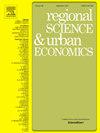Ideology, intergovernmental transfers, and public health spending: Evidence from South Korea
IF 2.9
2区 经济学
Q1 ECONOMICS
引用次数: 0
Abstract
This paper asks whether political ideology affects local government policies through intergovernmental transfers. When local governments depend on intergovernmental transfers, and the upper-tier grantor government has a limited ability to target resources at the local level, the grantor government may use transfers to indirectly promote local public goods that reflect its political ideology. Using data from 226 South Korean municipalities within 15 regions, we show that municipalities located in regions with left-wing regional governments receive significantly more health subsidies from the regional government than those located in regions with right-wing regional governments. The increase in health subsidies leads to greater municipal health spending. Our findings are consistent with the view that party and ideology influence local government policies.
意识形态、政府间转移和公共卫生支出:来自韩国的证据
本文探讨政治意识形态是否通过政府间转移影响地方政府政策。当地方政府依赖政府间转移支付,而上级授予政府在地方层面的资源定位能力有限时,授予政府可能会利用转移支付间接促进反映其政治意识形态的地方公共产品。利用韩国15个地区的226个直辖市的数据,我们表明,左翼地方政府所在地区的直辖市从地方政府获得的卫生补贴明显高于右翼地方政府所在地区的市政府。保健补贴的增加导致市政保健支出的增加。我们的发现与政党和意识形态影响地方政府政策的观点是一致的。
本文章由计算机程序翻译,如有差异,请以英文原文为准。
求助全文
约1分钟内获得全文
求助全文
来源期刊

Regional Science and Urban Economics
Multiple-
CiteScore
5.30
自引率
9.70%
发文量
63
期刊介绍:
Regional Science and Urban Economics facilitates and encourages high-quality scholarship on important issues in regional and urban economics. It publishes significant contributions that are theoretical or empirical, positive or normative. It solicits original papers with a spatial dimension that can be of interest to economists. Empirical papers studying causal mechanisms are expected to propose a convincing identification strategy.
 求助内容:
求助内容: 应助结果提醒方式:
应助结果提醒方式:


